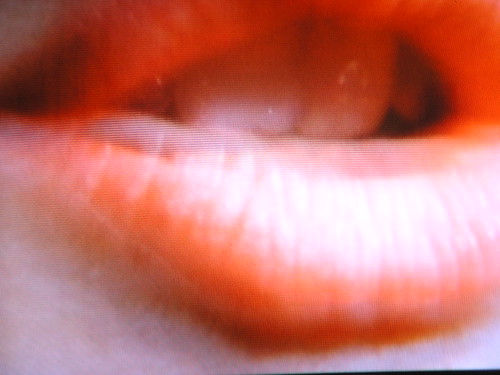 |
| Not I |
Poetry is performative in ways that fiction as novel is not. Story tellers have always existed of course but novels are more than stories in that we don’t expect novelists to read us entire books orexcerpts as though they were whole. We do however expect poets to read complete poems. That is partly a matter of brevity but also of a certain expectation, not just of orality, meaning the poem may be memorised or spoken or sung, but that we are aware that at its most effective it exists in the mouth, that the mouth is not just a vehicle for the sound but a miniature physical theatre where sound performs itself.
A poem is in some ways a mouth dance: the movements of the mouth producing the sound are an essential feature of the meaning, an enactment of meaning in which the complex emotions of the body are transmitted as expression in the same way as a grimace or a grin or a scream or a whisper articulate the body’s condition. We might perhaps imagine the movement of the mouth as a microscosm of the effects of the world upon both body and mind, as a laboratory or theatre, where the auditory becomes auditorium.
Poetry depends on a physicality of presence. People read poems to each other and listen with a particular kind of attention. Reading alound or silently is an act of trust just as suspension of belief in stage and actors constituties an act of trust. Poetry resists cheap staginess: it is its own stage. Even when we are dealing with poems whose central concern appears to be the page, as for example concrete poetry, or poetry whose visual aspect is an important aspect of our experience in reading it, such as the visual wit of e e cummings, or the long lines of Carolyn Forché or W C Williams , or in terms of sheer shape as in George Herbert’s Easter Wings, we are aware that visual space has it equivalent in sound. In any case, the power of the poem to conjure association through imagery prompts the visual imagination, its pitch and rhythms conjure the emotionalism of music, its manners register on the social level as forms of address, and its cloud of developing ideas spreads like weather across the landscape of the receiving mind.
That receiving mind is required to imagine the physicality of the poem’s production - the mouth dance, the mouth’s own auditorium: it is invited to indulge its imaginary senses and inhabit its own inner landscape more fully.
Reading a poem to another person is an act of assumed intimacy. A reading among friends is part chamber music, part entertainment. A reading to an audience of strangers is both those things but also potentially a sermon, a political meeting, a ritual, a circus, a cabaret, or a party. It is an essentially communal act.
The increasing popularity of the slam and the comedy-performance circuit often drives the poetry into the arms of party entertainment, a turn by someone particullarly good at doing a turn. Applause is courted and affirms both the applauder and the applauder. There are shared values and shared emotions. That which is known is confirmed. If I am not much drawn to this aspect of public performance it is because I feel it betrays the first cause of lyric poetry which is a turning away from social roles towards a communing with something beyond the accepted and known. I feel much the same about the poet on a political platform, or what used to be known as agit-prop. If the poem merely confirms what everyone already thinks it may be clever but it no longer questions itself. Cabaret, circus and ritual do more than this: they do not exhaust the public space but leave it hanging at the edge of something less determined.
Which is where Dylan Thomas, Li Po and Jean Valentine were. Their solitude engaged with a virtual other, not with a party of paying guests wanting to feel good about themselves. The magic circle of communality is best served with magic that wakens the intelligence and the senses not soothes them. That communal magic, like music, is best served with ritual, circus and cabaret, the more dangerous spaces of performance and performance, one way or the other, whether in the mouth, in the cafe or the public arena, is central to the experience of poetry.

No comments:
Post a Comment